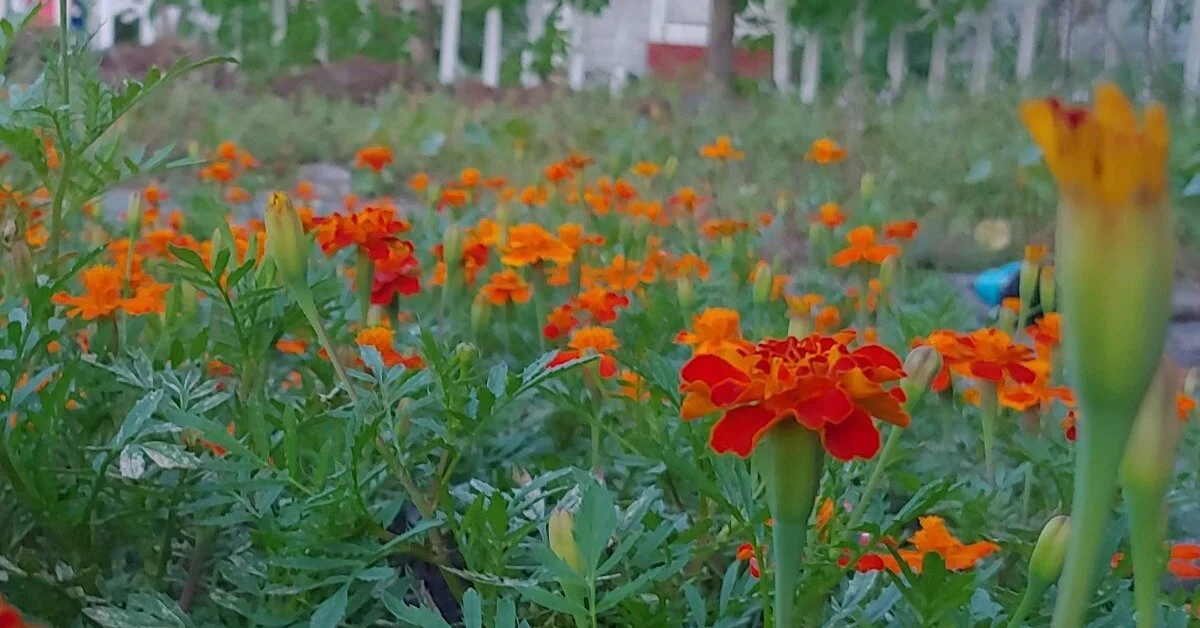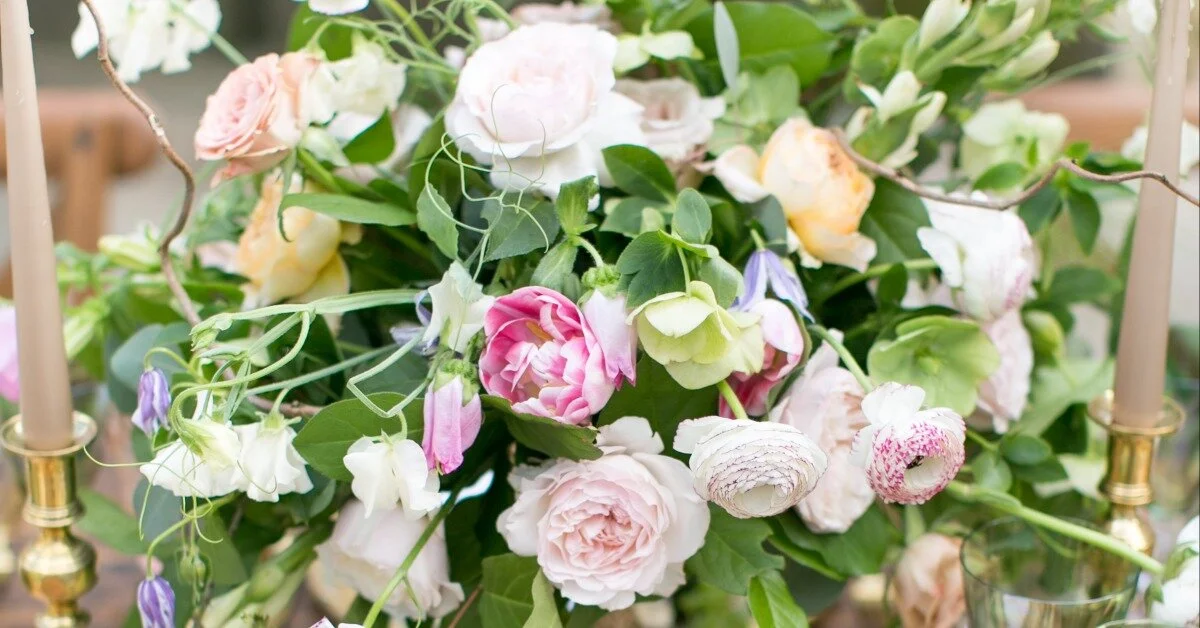Loss, Grief, and the Flower Farmer
To plant a garden is to believe in tomorrow. — Audrey Hepburn
Up until 2018, I believed I had a black thumb. Plants I bought withered, haphazardly tossed seeds dried in the ground, and I thought a green lawn was impossible.
I'd always loved nature; I watched the seasons change longingly, but I didn't try to insert myself into the earth's rhythms.
Then my mother was diagnosed with aggressive, late-stage cancer. I was thrown into the world of emergency resections, oncology teams, and balancing a myriad of specialist appointments.
Moving Forward in Flowers Amidst New Challenges
These marigolds were the first gardening success I had.
By February 2019, I hit a breaking point. If I didn't start doing something for myself, I was sure I'd lose my mind.
I bought some shake-and-spread marigold seeds and tore up a quarter of my lawn. I was ready to try and shake my anxiety over another gardening failure. I wept when they started to sprout a week later.
I spent chemo appointments talking to my mom about the baby plants, scouring for and reading grower's blogs, and diving into podcasts. She, a self-described “killer of anything but succulents,” was thrilled with my newfound passion, and we slowly started discussing my garden dreams.
The marigolds were joined by zinnias, dahlias, and star jasmine. My dream of growing flowers was fully realized, and I decided to try my hand at growing for more than myself.
Fast-forward a few months, and 2020 was not the year anyone expected. It was probably the worst time to start a business, but I forged ahead and slowly started selling the stems I'd lovingly overwintered. I'd just started my fall seeds when my mom's illness began to take the upper hand.
plants are resilient, even when forgotten for a time.
By September 2020, they were all but forgotten growing under the lights, but plants are resilient.
We realized we were losing her by December, but I started planning and sharing my 2021 garden with her.
She received video calls of me walking the grounds and marking beds. I potted some seedlings and a new vegetable bed was started.
I rationalized that she could have all the fresh salads she wanted by spring. When she entered a temporary care facility and rapidly started fading, I desperately tried to engage her in my bulb garden.
We talked about how she could come sit in the spring while I worked on it. I was in denial.
My mother passed on January 6, 2021.
The garden and my cutting beds became my only focus in the weeks that followed.
No one ever tells you how to keep your farm and business going in the face of losses like this. I've never even seen it addressed in any resources across the web, in books, or podcasts.
So, how do you balance it? While there isn't an easy one-size-fits-all answer, I can share what I did—and what I discovered through this journey.
As much as it feels like it should, the world somehow keeps spinning after the loss of your loved one. Plants need weeding and watering, clients need invoices, and emails need to be addressed.
Communicate Honestly
The best thing you can do is be incredibly honest with yourself and anyone you need to speak to. A simple "I have recently experienced a loss and would appreciate your patience during this time" message works well. Grief is part of human nature, and most will be more than sympathetic to your needs of time and patience.
Work with patience for the grief process
When it comes to the practical, hands-on needs of growing flowers, I aimed to do as much as I could whenever I felt like it. Checklists are a valuable tool to help you keep on track.
Giving yourself extra time to complete your checklist keeps you from overdoing things. If this means weeding at dawn, so be it. If you find yourself able to pot-on plants at midnight, go for it.
“Giving yourself extra time to complete your checklist keeps you from overdoing things.”
I worked outside for hours each day, every day because it kept my body busy while my mind was reeling. The key is turning your "must do" list into a "need to do as you can" list.
It’s Okay to Say No
It is absolutely okay to say no and mean it. If you don't feel like you can handle something (literally or emotionally), you are under no obligation whatsoever to do it.
If you're pre-contracted to do something, then I would (after letting that client know) pass it off to a coworker, another professional, or someone you trust to take on the responsibilities.
Stay Busy—Or Don’t: Honor Your Own Grief Process
Though some people prefer staying busy through this time, some do not—and both are valid ways to work through what you're experiencing.
“There is no shame in changing plans when faced with the new realities of life after a loss. ”
When it comes to the issue of "I planned x, y, and z for this season" or "I really wanted to do a you-pick sunflower field event," I had to remember that there is no shame in changing plans when faced with the new realities of life after a loss.
Some people will go the other way and scale up on what they'd planned on doing, needing the solace of hope and busy hands. In contrast to pausing or downsizing, there is absolutely nothing wrong with supercharging your original ideas if that’s what you need.
Give Yourself Permission to Experience Whatever Emotions AriSe
Grief and loss can present in hundreds of different ways. The most challenging for me was the emotional disassociation.
After planning tulip beds, I sat with my mom as we looked at planting options and listened to her feedback. I spent months chilling bulbs to make them work in my zone.
By the time they bloomed in February and March, I expected to feel a sense of joy and accomplishment. I was devastated to instead feel entirely apathetic for them.
“I can look back at them and feel that sense of peace I expected.”
I sat and cried over the unfairness of it all because they were a living reminder of my experiences.
Now, with some time and clarity, I can look back at them and feel that sense of peace I expected.
But this was a very typical experience for those of us moving through loss while trying to do work we love.
Ironically, my vegetable garden was the best “expectation vs. reality” moment of the spring. The bed I focused on the least as a business-minded flower grower gave me a treasure trove of pea shoots, herbs, and filler blooms for bouquets. It reminded me of the beauty of working with the seasons and savoring the little touches that make my design work special to me.
Growers and Farmers Are Able to Stay Tuned-In with the World at Large
Last but not least, I want to touch on the routine of farming. While many may not see it, those who work with the land, who follow the seasons, and watch the weather know the feeling of being in-tune with the wider world.
“While struggling to move forward after a loss, nurturing and cultivating flowers can be incredibly therapeutic. ”
While struggling to move forward after a loss, nurturing and cultivating flowers can be incredibly therapeutic. The sense of stability that comes from even a simple patch of marigolds cannot be discredited.
If you're reading this as someone not yet affected by loss, I hope that you'll keep these ideas close if you need them in the future. And if like me, you are grieving, are a caretaker, or are overwhelmed by what life throws at you these days, I hope you'll remember the quote at the start of this article and take inspiration and solace from it.
In loving memory of and with gratitude to Allison Walker-Lavette.











